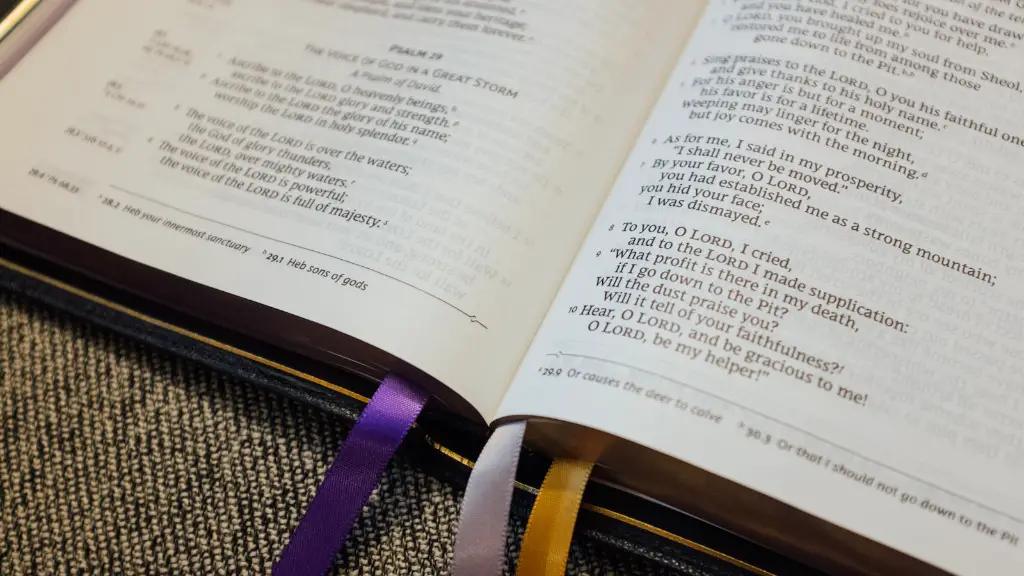The altar is one of the most significant religious symbols in the Bible. It can be found throughout the Old and New Testaments and has been used as a symbol of worship, sacrifice and dedication for centuries. The altar is an important part of many religions, including Christianity, Judaism and Islam, and in the Bible it is mentioned almost as often as the temple.
In the Bible, an altar is a structure used for religious purposes, specifically for offerings and sacrifices. It can be found in many different versions, from the small and simple stone slabs used in the early Hebrew days to the ornate and elaborate altars used by later generations. The altar is often seen as a symbol of the connection between God and humans, as it is dedicated to divine worship and offerings.
The Bible mentions the altar multiple times and gives detailed descriptions of how it should be built and used. Altars were typically built of earth or stones and were often decorated with carvings, images or plaque inscriptions. The altar was at the very center of worship and offerings, as both sacrifices and prayers were conducted here.
In the Old Testament, the altar was used mainly for sacrifices in an effort to appease God. According to the Bible, this practice was one of the main ways for people to “draw near” to God. In the New Testament, the altar was used for prayer and dedication, often being referred to as a place of repentance and forgiveness.
Altars have been used in many different forms throughout history, but the Bible’s description of the altar remains unchanged to this day. The altar is not only a place of worship, but also a reminder of God’s power and nature. As such, it is a source of comfort and hope for many people.
Meaning Behind the Altar
Many people believe the altar to have a strong spiritual meaning, not only for those who use it for worship but for all of humanity. The altar stands as a reminder of God’s eternal love and mercy, and how He has chosen us to be a reflection of that love. The altar is also often seen as a reminder of Jesus’ willingness to die for our sins and to be an example of sacrificing for others. In Christianity, the altar is seen as a focal point of worship and a place of spiritual renewal.
The altar is also seen as a place of renewal and transformation; the time spent in its presence is often seen as a time of reconnection to God and to one’s identity. It is seen as a powerful symbol of surrender and surrendering to the will of God. The altar is also seen as a place of healing and restoration, both in body and spirit.
The importance of the altar in the Bible is evident and illustrates the spiritual significance it has for many people. As a place of sacrifice and worship, the altar serves as a strong reminder to all believers of how to live in faith and how to love one another unconditionally. As a symbol of God’s grace and love, the altar stands as a reminder of faith, hope and love.
The Symbolism Behind the Altar
The altar holds many different symbolic meanings. In the Old Testament, the altar was seen as a physical representation of God, and symbolized the relationship between God and his people. In this way, it was a reminder of His promises and of the covenant between God and humanity. In the New Testament, the altar often represented Jesus and his willingness to sacrifice himself for mankind.
The altar is also a symbol of trust and obedience to God. By presenting offerings and sacrifices to God on the altar, people acknowledged His power and authority. The act of offering also symbolized the willingness to surrender to God, and to submit to his will.
The altar also has a strong spiritual meaning. In many traditions, the altar is a place of transformation, where prayer, meditation and contemplation all take place. In this sense, the altar is seen as a place of transformation and renewal. It is believed to be a place of healing, where the emotions, thoughts and spiritual life all come together in a powerful way.
The Significance of Altars in Today’s World
In today’s world, the altar still holds great spiritual significance, connecting people to the divine and to one another. Though the practice and style of worship may vary depending on traditions, the altar remains a powerful symbol of faith, trust and obedience. In many ways, it serves as a reminder of our connection with God and of the promises he has made to us.
Modern altars are often decorated with symbols, like candles and other symbols of spirituality. Some families even create altars in their homes, to honor their faith and strengthen their connection with God. These altars are becoming increasingly popular, as they provide a space to reflect and pray, as well as to gather and share meaningful conversations.
In today’s world, the altar stands as an important symbol of faith and connection to the divine. Though its symbolism and symbolism may vary from culture to culture, the altar’s spiritual meaning remains clear. It is a powerful reminder of our relationship with God, of His love and mercy, and of our shared commitment to living for Him.
The Art of Building an Altar
Building an altar is an art form that has been passed down for generations. It’s an important tradition in many cultures, as it serves as both a physical and spiritual connection to God. Building an altar involves gathering the necessary items and arranging them in a pleasing way. In many cases, the items used can include candles, flowers, scripture passages, images or symbols of faith.
The key to building an altar is to create a space that is inviting and peaceful. The goal is to create a space that is comfortable and calming. It’s important to keep in mind that the altar is a place to connect with God, so don’t forget to add items that will help with that, like a soft blanket, cushions or calming music.
Building an altar is a creative act that can be both enjoyable and meaningful. It is an opportunity to express love, devotion and thanks to God, while honoring the tradition of altar building. It is an act of worship and a reminder of God’s presence in our lives. It can be a place of solace and peace, as we take time to reflect on our lives, our faith and the beauty of His creation.
Altars in Different Religious Traditions
The altar is an important part of many different religious traditions. For some traditions, such as those of the African diaspora, the altar is a gathering place for community prayer and worship. For other traditions, like those of Hinduism, the altar is a place to honor deities and perform various rituals. In Judaism, the altar was traditionally used for sacrifices and for prayer services.
Altars are also used in contemporary Christianity as a place of devotion and communication with God. In some denominations, the altar is used specifically for communion, the ritual of breaking bread and drinking wine in memory of Jesus. In others, the altar is used for worship services and for prayer.
No matter how an altar is used, it is an important part of many religious traditions and can serve as a symbol of spiritual devotion and unity. No matter the tradition, the altar stands as a reminder of our connection with God, of His willingness to forgive and heal, and of our shared commitment to living in faith and love.
The Purpose of Altars
The primary purpose of an altar is to create a space of worship and communication with the divine. It is often used to receive offerings and prayers, as well as to foster a deeper connection with God. Through the altar, we can learn to surrender to God’s will and to let go of our negative thoughts and feelings. It is a place to come and sit in His presence, to listen and to receive guidance.
The altar can also be a source of comfort and peace. It can provide a sense of community and connection with others who share similar faith and beliefs. It can also serve as a reminder of God’s love for us, of His mercy and forgiveness, and of the shared commitment to live in faith and love.
No matter its purpose, the altar stands as a powerful symbol of faith, love and hope. It is an important part of many religions and a powerful reminder of God’s presence in our lives. As such, it serves an essential role in connecting us with the divine and in uniting us with one another.





